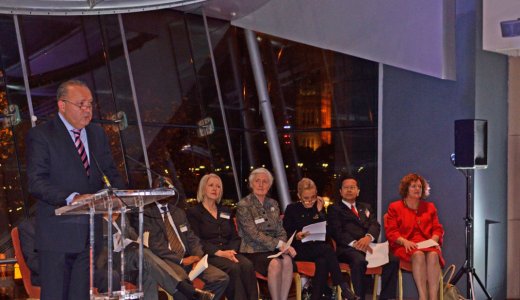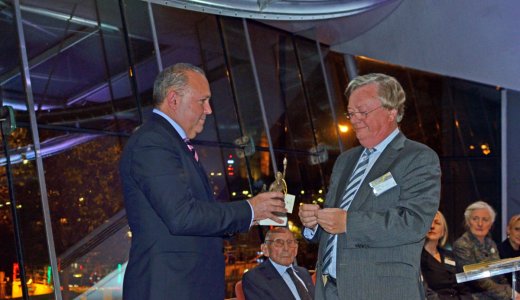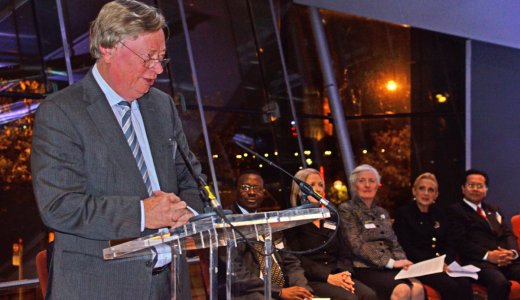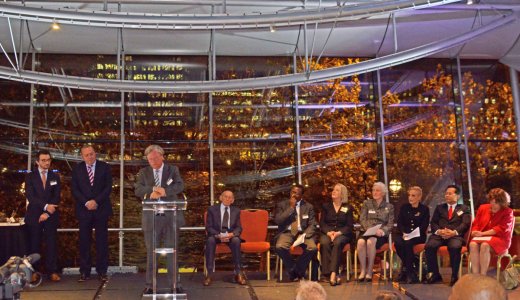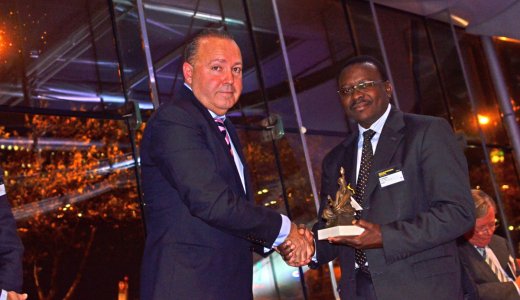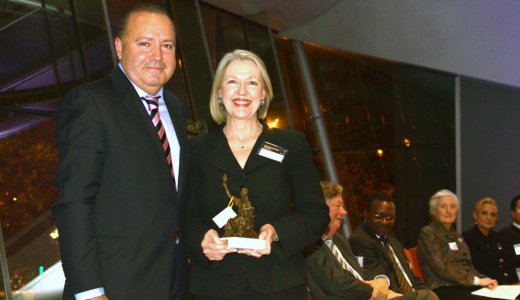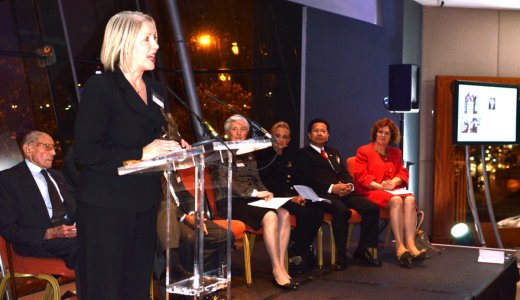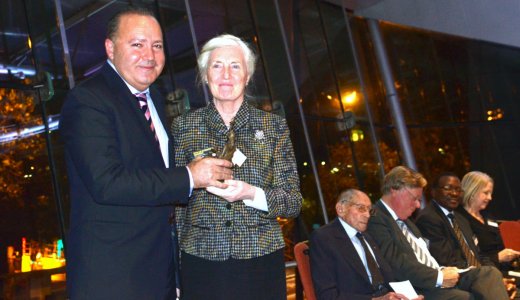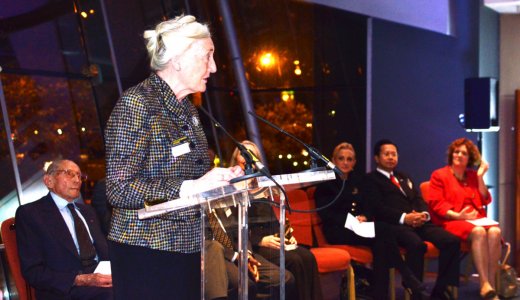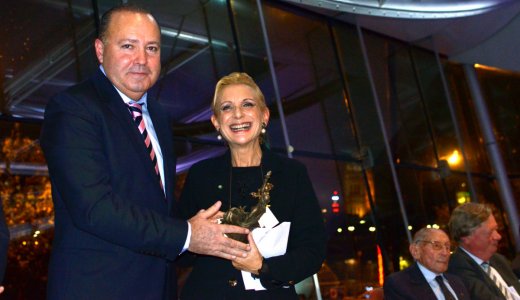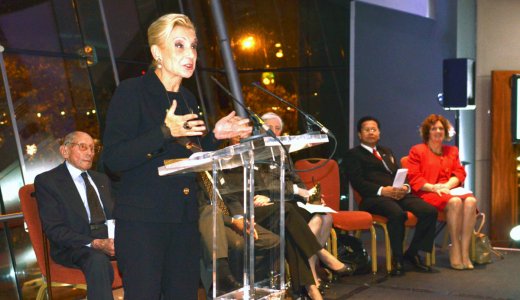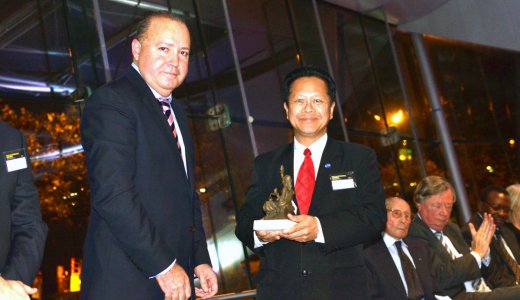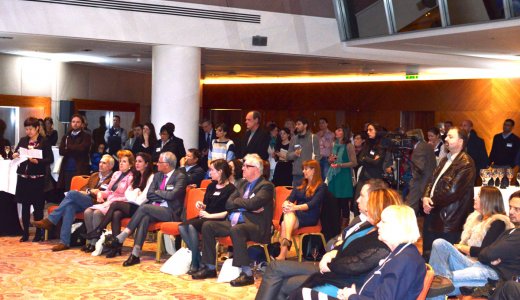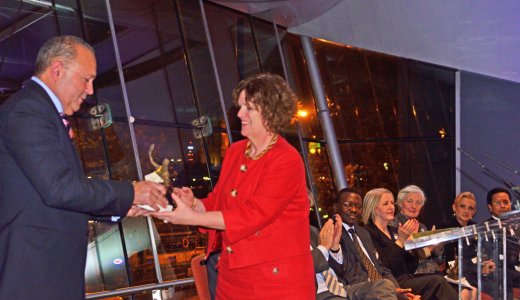
Within the framework of the Fifth IJJO International Conference “Criminality or Social Exclusion? Justice for Children in a Divided World” (London, 6-7 November), the Observatory will award the Second Edition of the IJJO ‘Juvenile Justice without Borders International Award’..
Through this award the International Juvenile Justice Observatory wishes to recognise the work of those institutions and personalities that have contributed to the outstanding progress and achievements made in the protection of children’s rights, in the legal and psychosocial field, as well as in the area of research and direct intervention with children and youth in conflict with the law.
In this context, the Second edition of the IJJO Award JJWB will be granted to recognise the policies aimed to improve the situation of children and young people at risk of social exclusion and contribute to highlight good practices concerning the issues related to juvenile justice.
In this way, in its second edition, the International Juvenile Justice Observatory will give the “Juvenile Justice without Borders” International Award to professionals and institutions that have shown a steady commitment and involvement in promoting a better situation and treatment of children and youth in conflict with the law.
Opening Speech
Francisco Legaz, Chairman of the International Justice Juvenile Observatory
2012 Edition Winners
In the second edition of the 'Juvenile Justice without Borders' International Award, the IJJO is honoured to give the Award to the following persons and institutions in recognition of their steady commitment and involvement in promoting a better situation and treatment of children and youth in conflict with the law.

Mr. Georges Loingerr
Honorific Award
The Juvenile Justice Without Borders International Award has a strong meaning for me and for all who have lived through wars and have seen how children’s rights were tremendously neglected. This recognition is a valuable reminder in this century, of the heroism and great courage shown by many people of the last century . It should remind us all to learn from the lessons of history in order to avoid repeating our mistakes today, when there are still many children denied a childhood while their lives are interrupted by meaningless conflicts and wars, and legal frameworks are imposed that deny them their rights.
Biography
Georges Loinger was born in August, 29th 1910 in Strasburg into the Jewish family. Although completed engineering studies, he became professor of physical education at Maimonides High School in Boulogne-Billancourt. Before the Second World War he had been taking care of young Jewish refugees from Germany within propriety of Baroness of Rothschild.
During the WWII he was prisoner of Germany but he managed to escape from Bavaria and joined his wife in Bournemouth, where it had already taken care of young refugees. He was appointed chief instructor of OSE, The organization for helping Children, and visited each of the children homes and also organized sports programs for young people.
He is responsible for establishing a chain of passages of children from France to the Switzerland in order to protect them from transport into the camps. The organization of the escape for children was genial: he took children to French - Swiss borders playing football and when the ball fell into Swiss territory, the child ran after it and stayed there in safe. He personally managed to salvage 350 of the 1,000 children who was evacuated by the OSE.

Prof. Dr. Jaap E. Doek
I consider the Juvenile Justice without Borders International Award not so much as a recognition of my past activities but above all as an encouragement and stimulus to continue my efforts to advice and support States parties to the CRC in their endeavours to realize a juvenile justice practice that fully respects and implements the rights of children in conflict with the penal law.
Biography
Jaap E. Doek is emeritus professor of Law (Family and Juvenile Law) at the Vrije Universiteit in Amsterdam (since July 2004) and Extraordinary Professor at the Institute for Graduate Studies and Research at the Anton de Kom University of Suriname since 2012. He has been the Dean of the Law Faculty at the Vrije Universiteit (1988 -1992). From 1998 - 2003 he was professor of Juvenile law at the University of Leiden. In 1993 he was a visiting scholar at the at Georgetown University School of Law (Washington DC) and the School of Law of the University of Michigan (Ann Arbor) and in 1999 he was a visiting porfessor at the Northwestern University School of Law (Chicago). He has been a juvenile court judge in the district court of Alkmaar and the Hague (1978-1985) and a deputy Justice in the Court of Appeal of Amsterdam (2007 – 2012).
He has been a member of the UN Committee on the Rights of the Child (CRC)(1999 - 2007) and the chairperson of that Committee (2001-2007).
He is the chairperson of Aflatoun. Child Savings International (since Dec. 2006), an International NGO promoting Social and Financial Education for Children (Amsterdam) , a member of the Advisory Committee of the Innocenti Research Centre of UNICEF in Florence, a member of the Board of Trustees of the African Child Policy Forum (Ethiopia) since 2005, a member of the Board of Child and Youth Finance since 2011, a member of the Advisory Council of Plan The Netherlands , a member of the expert committee for the selection of candidates for the Annual Children's Peace Prize (initiative of KidsRights, The Netherlands) and the HumanRights Tulip Award (established by the Minister of Foreign Affairs of the Netherlands)
He has been an advisor/consultant of the Special Representative of the Secretary General of the UN on Children and Armed Conflict and the regional office of UNICEF for East and Southern Africa and is currently a consultant for a number of UNICEF country offices ( Armenia, Azerbaijan, Kazakhstan and Nepal) and some governments of States Parties to the CRC.
Prof. Doek has been founding member of the International Society for the Prevention of Child Abuse and Neglect (ISPCAN) and board member 1976-1992 (President 1982-1984 and Vice President for developing countries 1984-1992) and in that capacity involved in the establishment of the African Network for Prevention and Protection of Child Abuse and Neglect (ANPPCAN). He was also involved in the creation of Defence for Children International (DCI; 1979) and established the Dutch Section of this organisation (1984). He has been a member of an ISPCAN/DCI working group on Child Labour which conducted a large study on Child Labour (1994-1997).
He was a member of the Board of the International Association of Juvenile and Family Court Magistrates 1982-1986).

Mr. David Mugawe
This Award is an important recognition in terms of achievements as it represents an opportunity for me to share and disseminate interesting findings coming out of the research we have carried out in the area of children’s rights. This Award is also a chance for us to provide an African perspective on issues regarding children’s rights. Being a young continent with a high number of young people, we are living a critical time in terms of awareness and also of investing in the future of young people. Finally, this Award represents an opportunity to recall the importance to underlining the interface between the legal and traditional law that affects the protection of the rights of young people in Africa.
Biography
David Mugawe has over 20 years experience of programme and project management in international development gained in African and beyond. David has a Masters in Business Administration from Bradford University in the UK and a Degree in Social work and Administration from Makerere University, Uganda. He has also done post graduate courses in Economic Principles, Project Planning & Management, and Financial Management. David is currently the Executive Director of The African Child Policy Forum (ACPF), an independent, not-for-profit, pan-African institution of policy research and dialogue on the African child based in Addis Ababa, Ethiopia. ACPF was established with the conviction that putting children first on the public and political agenda is fundamental for the realisation of their rights and wellbeing and for bringing about lasting social and economic progress in Africa. ACPF aims to specifically contribute to improved knowledge on children in Africa; monitor and report progress; identify policy options; provide a platform for dialogue; collaborate with governments, inter-governmental organisations and civil society in the development and implementation of effective pro-child policies and programmes and also promote a common voice for children in and out of Africa. David has successfully developed, managed and coordinated ACPF’s programmes. He is an advocate of child rights and child justice. He has co-authored a number of publications among which are: The African Report on Child Wellbeing: How Child-friendly are African Governments, Child Poverty in Africa: International and African Perspectives, Born to High Risk: Violence against Girls in Africa. Before joining ACPF, David was the Country Director for eight years with International Care & Relief (now Build Africa). He managed and implemented a variety of international programmes dealing with a cross-section of development issues. Whilst working at International Care and Relief (ICR) - a UK based development charity focusing on the development of young people - David oversaw a variety of projects working with children, young people, women and the wider communities to implement human rights, child and juvenile justice, education, health, HIV/AIDS, skills training, agriculture and micro finance projects.

Mrs. Wansley Walters
On behalf of the Florida Department of Juvenile Justice (DJJ), I am deeply honored to accept the Juvenile Justice Without Borders International Award from the International Juvenile Justice Observatory (IJJO). This prestigious honor means that the agency I lead is recognized for doing its utmost to provide the right service to the right youth at the right time. Using data and research to drive decisions and verify outcomes, Florida strives to lead the nation in its reform of juvenile justice administration. I am profoundly grateful to the IJJO for recognizing Florida’s leadership in juvenile justice and this award confirms that we at DJJ are on the correct path.
Biography
Wansley Walters serves as the Secretary for the Florida Department of Juvenile Justice (DJJ), which represents the largest statewide system falling under one agency in the United States. She was appointed to head the agency by Governor Rick Scott in January 2011. Florida is engaging in comprehensive reform at DJJ and investing more resources in the front end of the juvenile justice system. During her tenure, delinquency has declined 21%, commitment to residential facilities has declined 39%, and secure detention has declined 12%. Previously, Secretary Walters was the Director of the Miami-Dade County Juvenile Services Department. Ms. Walters developed and headed a National Demonstration Project with the U.S. Department of Justice Office of Juvenile Justice and Delinquency Prevention (OJJDP) and national researchers in the field of juvenile justice. The program facilitated a ten year reform effort that has reduced juvenile arrests by over 50%, juvenile re-arrest by 80%, and secure detention by 66%. During her period as director of juvenile services, Miami-Dade not only had the lowest youth incarceration rate in the state, but also boasted one of Florida's lowest juvenile crime rates. She is a frequent presenter on juvenile justice at both national and international conferences.

Mrs. Renate Winter
I am not only greatly honoured, but I am also extremely moved to be receiving this award. I am also quite stunned that this award exists! As I understand it, awards are normally conferred on those working in science, economics, medical research or in the technical fields - in short, in areas that benefit adults first and foremost. Rarely have I heard of an award for those working for the benefit of children!
Biography
Judge Renate Winter was appointed by the Secretary-General of the United Nations to the Special Court for Sierra Leone in 2002. She served as its Acting President from March to May 2004 and in May 2008, she was elected President. Since 1981, Judge Winter has been a judge at the Vienna Youth Court, where she has undertaken projects to help rehabilitate youth with problems of drug addiction and mental disability. Judge Winter has also worked on projects relating to youth and child soldiers for the United Nations, including in numerous African countries, and has dealt with issues of organized crime and restorative justice. Judge Winter has previously served as international judge of the Supreme Court of Kosovo, as part of the United Nations interim civilian administration. Throughout the 1990s, Judge Winter chaired numerous international conferences on matters relating to juvenile justice and gender-related justice issues. She is the former President of the International Association of Youth and Family Court Judges.

D.G. for the implementation of judicial provisions
Department for Juvenile Justice
Ministry of Justice of Italy
Recibir el Premio Internacional OIJJ es una fuente de satisfacción por toda una vida como trabajadora social al principio, como directora de una institución penal después y actualmente como directora general para la aplicación de disposiciones judiciales de los 30.000 jóvenes que entran en el circuito penal en Italia.
Receiving the IJJO International Award is a source of satisfaction for a lifetime spent first as a young social worker, then as director of penal institution and now as general director for the implementation of judicial decisions of the 30,000 young people who enter the criminal circuit in Italy. It 'a recognition that enhances the impressive work over the years by the Italian Juvenile Justice about the recognition and enhancement of the human capital of young people, the loss or neglect of that affects the wealth of a nation, of every nation.

Mrs. Serenella Pesarin
General Director
General Direction for the implementation of judicial provisions
Biography
Serenella Pesarin was born in Roma on the 26th of January 1950 and has three sons. Socio-psychologist, she has specialised in many psycho-socio-educational areas and in communication processes. She has been Professor of General Psychology and Developmental and Education Psychology at the University "Magna Graecia" of Catanzaro. She has been Professor of General Psychology at the LUMSA - Libera Università Maria SS. Assunta - of Rome, where she currently holds the post of Professor in Social Psychology. She held numerous conferences and lectures regarding the juvenile area at several Universities on the national territory, including, for instance, the Catholic University of Milan, Università degli Studi Roma Tre, the University of Naples Federico II. On the operational side she has been Director of the Juvenile Criminal Institutes of Catanzaro and Turin and Director of the Center for Juvenile Justice in Calabria and Basilicata and in Piedmont and Val d'Aosta.
Since December 2004 she is General Director of the Direction for the implementation of judicial provisions of the Department for Juvenile Justice. She cooperates with Ministries, Agencies, Associations and other bodies in planning and implementation of activities aimed at protecting and safeguarding the minors subject to provision of the Judicial Authority, as well as at ensuring them opportunities for recovery, social and rehabilitation paths and vocational training. She is member of many organizations, including the National Observatory for Children and Adolescents and the United Nations Committee on the Rights of the Child. She is speaker at national and international Conferences and intervenes on television and radio broadcasts concerning the issues of adolescent disorders and delinquency. She writes books and collaborates in the drafting of publications related to the theme of minors and all problems connected.
D.G. for the implementation of judicial provisions of the Department for Juvenile Justice. Ministry of Justice. Italy
The Direction for the implementation of judicial provisions of the Department of Juvenile Justice seeks to ensure the implementation of criminal measures decided by juvenile judicial authorities, thus guaranteeing the certainty of the punishment, the protection of the children's rights, the promotion of the adolescent development. It is structured on a central and local level and it aims at the social and employment reinsertion of minors in conflict with the law. It deals with the protection of rights for minors and young adults - from 14 to 21 years of age - who are subjected to penal measures, through interventions of a preventive, educational and social-reintegration kind, and also through the implementation of study, training and leisure programmes, in order to ensure a real integration of these minors and young adults in the outside community.
Education, professional training and work are fundamental tools in the treatment, both for their intrinsic value and as means to express and realize individual capacities.

Department of Juvenile Observation and Protection Ministry of Justice of Thailand
This prestigious award will become a symbol not only of the work that we have done, but also of the work that we still need to face in the future. We are only at the beginning. The recognition that this award brings comes as a beacon of light that will inspire other nations in the region and in the world as we work together to improve the lives of all young people. So, in closing, I deeply appreciate your confidence and trust in us as a recipient of this award.

Mr. Tawatchai Thaikyo
Deputy Permanent Secretaries for Justice
Biography
Mr. Tawatchai Thaikyo is a Deputy Permanent Secretary of Ministry of Justice the position being appointed on October 2012. He was a former Director General of the Department of Juvenile Observation and Protection under the Ministry of justice where he had been working for 4 years since 2008. Prior to these positions he was appointed to be a Deputy Director General of Department of Juvenile Observation and also a Deputy Director General of Department of Probation Ministry of Justice. He graduated with a master degree in Criminal Justice from the Faculty of Social Science and Humanities, Mahidol University. Mr. Tawatchai Thaikyo has always been a person who initiating changes and development to improve the system of organizations he worked with to ensure the best practice for the people they served. All through his time working at the Department of Juvenile Observation and Protection, he devoted time and energy to work toward improvement of the Juvenile justice system in several ways. In the past years he has been receiving awards as recognition of his excellent work and dedication in the field including the first rate Government Officer of Ministry of Justice Year of 2001, and the award in Rehabilitation, Treatment and Development of Drug Addict from the Prime minister of Thailand Year 2007, and the award in best Government Sector in the Support of Human Equality and Feminization in the year 2011. He is a chairman of the Juvenile Justice Reform Project, the three years research project supporting by the Thai Health Foundation, aiming to improve the effectiveness of the Juvenile Justice system in Thailand.
Department of Juvenile Observation and Protection
The Department of Juvenile Observation and Protection is the organization that responsible for providing services for the juvenile justice population and children and family cases has been operating under several international rules and guideline including the Convention on the Rights of the Child, United Nations Guidelines for the Prevention of Juvenile Delinquency (The Riyadh Guidelines), United Nations Standard Minimum Rules for the Administration of Juvenile Justice (Beijing Rules), and United Nations Rules for the Protection of Juveniles Deprived of their Liberty. One sample of the exertions to enhance the treatment and rehabilitation quality of the juvenile, the Department conduct the Juvenile Justice Reform Project, a research project funding by the Thai Health Promotion Foundation, which carried out research to develop the classification tools and system and treatment and rehabilitation programs to meet with the individual requirement of the children in conflict with law and to promote the case management method to rehabilitation procedure for the juveniles.
Today the Department’s works cover Juvenile Protection and Observation Centers situating in all 77 provinces processing approximately 40,000 juvenile cases per year and also direct all of the 18 juvenile training centers in Thailand.
Vision & Mission of Juvenile Observation and Protection Department
Vision:
To be a leader in delivering excellent services in protecting children’s rights and rehabilitating and returning good and productive juveniles into society.
Mission:
1. To promote child rights protection and child welfare, and strengthening family and society institutions through the use of restorative justice, diversions, and other alternative measures.
2. To provide efficient work on criminal and family cases including governance supervision, rehabilitation, protection, and other assistance services as well as follow up and evaluation of the cases.
3. To strive for evidence base practices by conducting research relate to improvement of juvenile justice procedure and interventions, and initiate the development of appropriate laws and regulations that address child rights protection and best practices for case procedures in order to increase quality of life for the juveniles.
4. To facilitate and create networks with all stakeholders in communities both public and private sectors, domestically and internationally and in order to participate in and provide support for the juvenile justice system and to assist in prevention of the juveniles entering the justice system.
5. To improve better personnel and administrative managements in accordance with governmental administration standards.

Durham County Council, England
Durham County Council has a long history of providing secure care services for vulnerable and difficult children and young people from all over England and Wales. Our new secure children's home at Aycliffe, which opened in 2011, is based on that experience and aims to reflect national and international standards of excellence in building design and therapeutic practice; a balance between safety and security and for the successful reintegration of young people. The Council is proud of its achievements and honoured to receive the recognition of the 2012 Biennial International Award from the International Juvenile Justice Observatory.
Biography
Durham County Council is the unitary authority of County Durham in north east England. It provides public services and political leadership for County Durham. County Durham has around 513,000 people living in about 223,000 households. The county covers an area of 223,260 hectares (2230 square kilometers/862 square miles) with 12 major centres of population including Durham City, Chester-le-Street, Newton Aycliffe, Consett and Peterlee.
Durham County Council has developed a new vision to reflect the views and aspirations of the community and opportunities for improvement. This vision is focused around an 'Altogether Better Durham', and is made up of two components: to have an Altogether Better Place, which is Altogether Better for people.
This vision helps to provide a framework which guides all of our plans and programmes which will turn our vision into a reality. This will be achieved through organising our actions for improvement into a structure made up of five priority themes:
Altogether wealthier: Focusing on creating a vibrant economy and putting regeneration and economic development at the heart of all our plans.
Altogether better for children and young people: Helping children and young people to develop and achieve their aspirations and to maximise their potential in line with the Government's Every Child Matters initiative.
Altogether healthier: Improving health and wellbeing.
Altogether greener: Ensuring an attractive and 'liveable' local environment, and contributing to tackling global environment challenges..
This vision is shared by our partners and forms the basis of the new Sustainable Community Strategy.
Councillor Claire Vasey, Cabinet Member for Children, Durham County Council.
Gail Hopper, Head of Safeguarding Services, Durham County Council.
Gill Palin, Centre Director, Aycliffe Secure Centre for Children.
Warwick McCullough, Design Director, HPA Architecture Ltd.
Fiona McGlone, Project Director, Napier Watson Consulting Ltd.
With financial support from the
Criminal Justice Programme of the European Union


